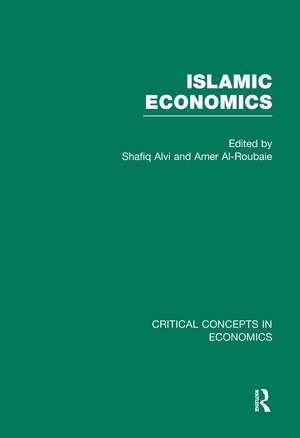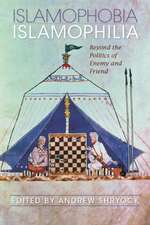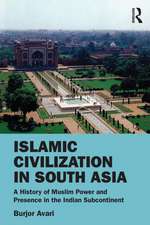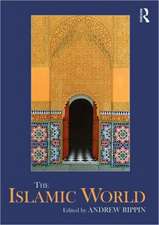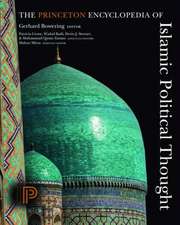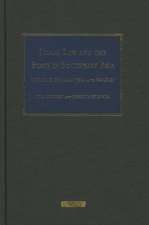Islamic Economics: Critical Concepts in Economics
Editat de Shafiq Alvi, Amer al-Roubaieen Limba Engleză Hardback – 15 iul 2013
Western economists define economics as the branch of knowledge or science which investigates how scarce resources are best allocated into competing claims upon them. These claims are socially and culturally determined. Islamic economics and its principles have also developed from a specific set of social and cultural circumstances, but the key to the whole subject is the guidance given in the Prophetic scriptures. The tenets laid down in the Qur’an provided the basis for a comprehensive, and continuous, system of social and cultural, and hence also economic, behaviour, for which there is no Western equivalent.
This collection analyses the rationale of Islamic values and Islamic laws in economic activities. It examines how Islam has contributed several alternative values to business and economic policies in Muslim countries. Consideration is also given to how Islam can be considered as a universal system that can be applied to various economic policies, business strategies and government regulations.
Din seria Critical Concepts in Economics
- 34%
 Preț: 3689.81 lei
Preț: 3689.81 lei - 34%
 Preț: 4243.64 lei
Preț: 4243.64 lei - 34%
 Preț: 4377.43 lei
Preț: 4377.43 lei - 34%
 Preț: 3956.84 lei
Preț: 3956.84 lei - 34%
 Preț: 3961.32 lei
Preț: 3961.32 lei - 34%
 Preț: 5223.59 lei
Preț: 5223.59 lei - 34%
 Preț: 6743.26 lei
Preț: 6743.26 lei - 34%
 Preț: 6746.51 lei
Preț: 6746.51 lei - 34%
 Preț: 4370.77 lei
Preț: 4370.77 lei - 34%
 Preț: 6741.63 lei
Preț: 6741.63 lei - 34%
 Preț: 6737.14 lei
Preț: 6737.14 lei - 34%
 Preț: 6747.74 lei
Preț: 6747.74 lei - 34%
 Preț: 6742.03 lei
Preț: 6742.03 lei - 33%
 Preț: 1857.25 lei
Preț: 1857.25 lei - 34%
 Preț: 4187.95 lei
Preț: 4187.95 lei - 34%
 Preț: 6191.45 lei
Preț: 6191.45 lei - 34%
 Preț: 5629.25 lei
Preț: 5629.25 lei - 34%
 Preț: 7581.12 lei
Preț: 7581.12 lei - 34%
 Preț: 6198.37 lei
Preț: 6198.37 lei - 34%
 Preț: 4378.92 lei
Preț: 4378.92 lei - 34%
 Preț: 7305.61 lei
Preț: 7305.61 lei - 34%
 Preț: 6746.93 lei
Preț: 6746.93 lei - 34%
 Preț: 6189.80 lei
Preț: 6189.80 lei - 34%
 Preț: 6737.14 lei
Preț: 6737.14 lei - 34%
 Preț: 4231.59 lei
Preț: 4231.59 lei - 34%
 Preț: 6737.70 lei
Preț: 6737.70 lei - 34%
 Preț: 6693.08 lei
Preț: 6693.08 lei - 34%
 Preț: 5071.50 lei
Preț: 5071.50 lei
Preț: 5495.14 lei
Preț vechi: 8520.40 lei
-36% Nou
Puncte Express: 8243
Preț estimativ în valută:
1051.64€ • 1093.86$ • 868.18£
1051.64€ • 1093.86$ • 868.18£
Carte tipărită la comandă
Livrare economică 14-28 aprilie
Preluare comenzi: 021 569.72.76
Specificații
ISBN-13: 9780415519601
ISBN-10: 0415519608
Pagini: 1872
Dimensiuni: 156 x 234 x 137 mm
Greutate: 3.49 kg
Ediția:New.
Editura: Taylor & Francis
Colecția Routledge
Seria Critical Concepts in Economics
Locul publicării:Oxford, United Kingdom
ISBN-10: 0415519608
Pagini: 1872
Dimensiuni: 156 x 234 x 137 mm
Greutate: 3.49 kg
Ediția:New.
Editura: Taylor & Francis
Colecția Routledge
Seria Critical Concepts in Economics
Locul publicării:Oxford, United Kingdom
Descriere
The editors of this new collection write:
Western economists define economics as the branch of knowledge or science which investigates how scarce resources are best allocated into competing claims upon them. These claims are socially and culturally determined. Islamic economics and its principles have also developed from a specific set of social and cultural circumstances, but the key to the whole subject is the guidance given in the Prophetic scriptures. The tenets laid down in the Qur’an provided the basis for a comprehensive, and continuous, system of social and cultural, and hence also economic, behaviour, for which there is no Western equivalent.
This collection analyses the rationale of Islamic values and Islamic laws in economic activities. It examines how Islam has contributed several alternative values to business and economic policies in Muslim countries. Consideration is also given to how Islam can be considered as a universal system that can be applied to various economic policies, business strategies and government regulations.
Western economists define economics as the branch of knowledge or science which investigates how scarce resources are best allocated into competing claims upon them. These claims are socially and culturally determined. Islamic economics and its principles have also developed from a specific set of social and cultural circumstances, but the key to the whole subject is the guidance given in the Prophetic scriptures. The tenets laid down in the Qur’an provided the basis for a comprehensive, and continuous, system of social and cultural, and hence also economic, behaviour, for which there is no Western equivalent.
This collection analyses the rationale of Islamic values and Islamic laws in economic activities. It examines how Islam has contributed several alternative values to business and economic policies in Muslim countries. Consideration is also given to how Islam can be considered as a universal system that can be applied to various economic policies, business strategies and government regulations.
